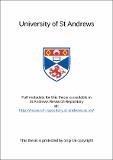Development of foraging in wild chimpanzees
Abstract
Recent work on social learning in primates has primarily been approached from a perspective that focuses on demonstrating human-like learning abilities rather than the efficacy of social learning within natural and ecologically relevant conditions. This thesis takes a functional approach and investigates the development of foraging behaviour in wild chimpanzees. Data were collected over 12 months on mother, infant and juvenile chimpanzees in Budongo Forest, Uganda. Feeding behaviour was studied comparatively, relating infants' foraging with the more competent patters of juveniles and mothers. Infants started to feed independently in the second half of their first year but only on soft-shelled, easily processed foods. The infant's diet was similar to the mother's by the end of the fourth year in terms of the breadth of food items consumed but at this age infants were still less proficient at processing foods. Infants had particular difficulty processing some embedded foods and these were the final items to be incorporated into the diet. Young infants under the age of 2.5 years selectively spent time near their mother when she was feeding, visually attended at higher levels to their mother's feeding behaviour, and synchronised playful manipulations of food items and later their own independent feeding attempts when their mother was feeding. However, none of these effects were more evident when their mothers were feeding on difficult food items. The sharing of food between mother and infant emerged as a more important opportunity for social learning. Infants initiated these interactions by soliciting food from their mothers. Difficult foods were shared at higher rates than easy foods and most frequently in the infant's first and second year. The higher sharing rate of difficult foods was due to infants focusing their solicitations on these items that they found difficult to procure or process. These results suggest that infants are refined not only in their attempts to acquire food from their mothers but perhaps also information about feeding habits.
Type
Thesis, PhD Doctor of Philosopy
Collections
Items in the St Andrews Research Repository are protected by copyright, with all rights reserved, unless otherwise indicated.

